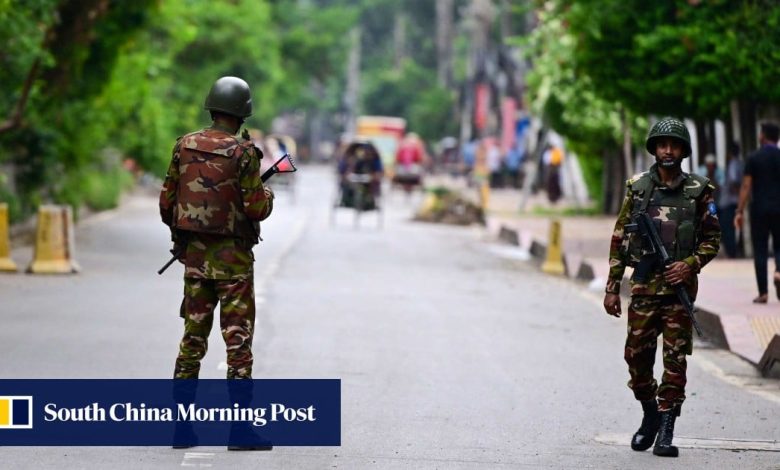Bangladesh accepts court ruling to cut state job quotas after unrest, eases curfew

The Bangladesh government said on Tuesday it would heed a Supreme Court ruling that 93 per cent of state jobs be open to competition, meeting a key demand of students after a week of some of the country’s deadliest protests in years.
But students raised fresh demands including the scrapping of a curfew, restoration of internet services and a reopening of campuses, leaving unclear whether the government’s acceptance of the court decision would completely defuse the unrest.
Relative calm prevailed for a second straight day in Dhaka and most major cities, although the army chief said security had still not been entirely restored after he surveyed the capital city by helicopter.
The government announced an easing of the curfew imposed to help contain the unrest, lifting it from Wednesday between 10am and 5pm to allow people to shop for essentials, with offices reopened between 11am and 3pm.

Bangladeshi authorities also shut down mobile internet and deployed the army after clashes between protesters and security forces spread across the South Asian country of 170 million.
Almost 150 people have been killed in the violence, with more than 1,600 arrested in the two main cities, Dhaka and Chittagong.
The protests tailed off after the Supreme Court ruled on Sunday in favour of an appeal from Prime Minister Sheikh Hasina’s government and directed that 93% of jobs should be open to candidates on merit.
“The government has acted in line with the Supreme Court verdict,” Law Minister Anisul Huq told reporters, showing the official gazette notification to that effect.
“The quota reform is done, now I hope the students will concentrate on their studies,” he added.
Sarjis Alam, a protest coordinator, said students wanted their new demands fulfilled within 48 hours, in addition to an apology from Hasina for the deaths of protesters, but did not say what would happen if the deadline wasn’t met.
Hasina’s government scrapped quotas in 2018 that had reserved 56 per cent of state jobs for various categories of people, including 30 per cent for families of those who fought in the country’s 1971 war of independence. But a high court ruling reinstated the quotas last month, triggering the student protests.
Students were furious because quotas left less than half of state jobs open to merit amid an unemployment crisis, particularly in the private sector, making government sector jobs with their regular wage hikes and perks especially prized.
The unrest has posed a new headache for Hasina as her government has sought to fix the struggling economy after securing a US$4.7 billion International Monetary Fund bailout last year.
Hasina told business leaders in Dhaka on Monday that her political opponents were responsible for the violence, and that the curfew would be lifted “whenever the situation gets better”.

The main opposition Bangladesh Nationalist Party (BNP) denied involvement in the violence.
Critics have previously accused Hasina of authoritarianism, human rights violations and crackdowns on free speech and dissent – allegations her government denies.
Zunaid Ahmed Palak, a junior technology minister, told reporters that repairs were being carried out to restore telecoms services after some communications infrastructure was vandalised during the violence.
He said broadband internet would be restored by Tuesday night but did not comment on mobile internet.
Additional reporting by dpa





